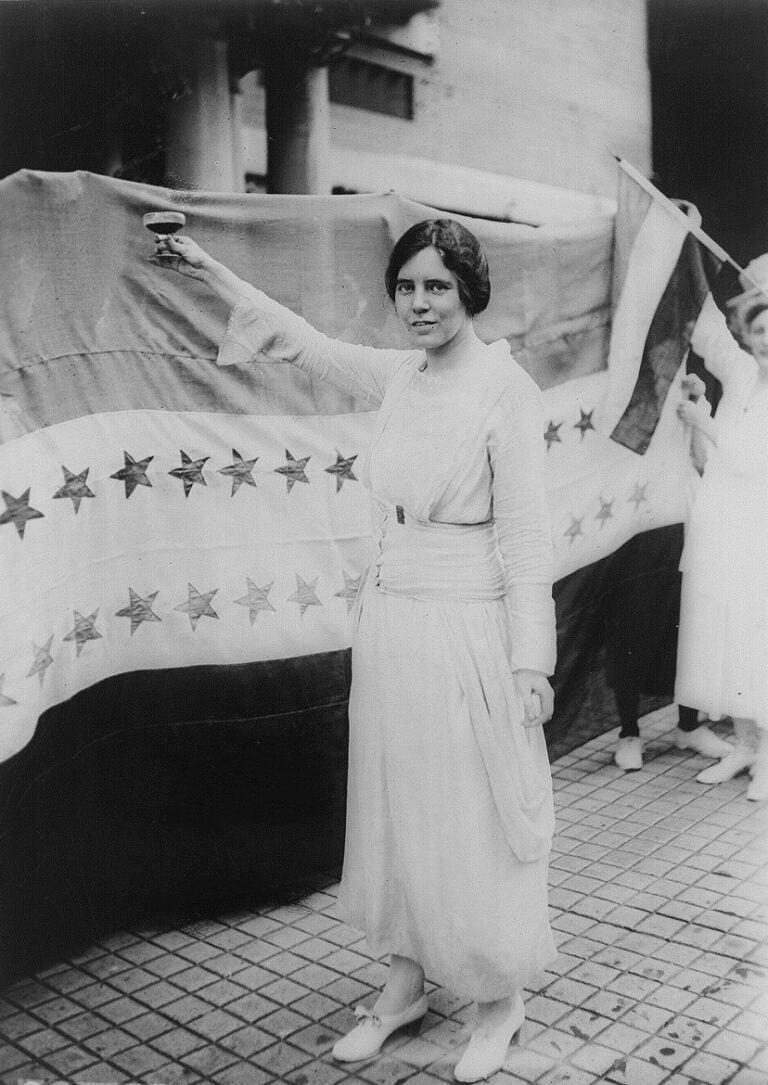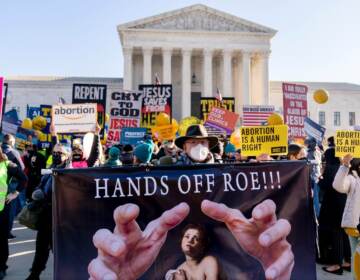Fifty years of equal rights for women in Pennsylvania: A case for the federal Equal Rights Amendment
The success of the Pa. Equal Rights Amendment proves there should be a federal Equal Rights Amendment, writes Chancellor of the Philadelphia Bar Association Lauren P. McKenna.

Alice Paul toasting (with grape juice), the passage of the Nineteenth Amendment on Aug. 26, 1920. (Harris & Ewing, Inc./Public domain)
Earlier this year, the Philadelphia Bar Association celebrated the 50th anniversary of the Pennsylvania Equal Rights Amendment. The success of the Equal Rights Amendment in Pennsylvania proves there should be a federal Equal Rights Amendment.
On May 18, 1971, Pennsylvania became the first state in the country to amend its constitution to include an equal rights amendment, although the constitutions of Utah and Wyoming already had equal rights provisions when they were first adopted. The Pennsylvania Equal Rights Amendment (ERA) provides that: “Equality of rights under the law shall not be abridged in the Commonwealth of Pennsylvania because of the sex of the individual.”
Urged by the six women in the Pennsylvania legislature at the time, Gerald Kaufman, the prime sponsor of the resolution, introduced it in November 1969.
There were no hearings and no legislative history. In today’s world, it seems amazing that the ERA passed both houses in two consecutive sessions with no dissenting votes. When asked, Kaufman told his male colleagues that it was simply the right thing to do. In May 2021, Pennsylvania voters approved a similar constitutional amendment that bars discrimination on the basis of race or ethnicity, again without controversy.
The ERA has impacted many areas of life in Pennsylvania, including family law, adoption, auto insurance rate-making, and education. It has been used to provide equal rights for both women and men. The need for the Pennsylvania ERA is demonstrated by a lawsuit challenging the male-only admissions policy at Philadelphia’s elite Central High School in the early 1980s. The case failed when the plaintiffs argued that the policy violated the Equal Protection Clause of the 14th Amendment to the United States Constitution. However, several years later, another case was successful when the advocates alleged that the policy was a violation of the Pennsylvania ERA.
Just as it was in Pennsylvania, adopting a federal ERA to the Constitution of the United States of America is the right thing to do. A federal ERA is essential because the U.S. Constitution has never been interpreted to protect equality based on sex as strongly as other suspect classifications. It would also provide a fundamental legal remedy against sex discrimination by guaranteeing that constitutional rights may not be denied or abridged on the basis of sex.
A federal ERA would treat sex as a suspect classification, similar to how race, religion, and national origin currently are treated. Governmental actions that treat men and women differently as a class would be subject to strict judicial scrutiny and would have to meet the highest level of justification — a necessary relation to a compelling state interest — to be upheld as constitutional.
Philadelphia is the birthplace of American democracy. The term “Philadelphia lawyer” was used in the 18th century to refer to members of the Philadelphia bar as being exceptionally well-trained and skillful advocates. It is therefore appropriate that a Philadelphia lawyer, Alice Paul, first drafted a federal ERA in 1923. The current version which was sent to the states to ratify in 1972 provides:
Section 1: Equality of rights under the law shall not be denied or abridged by the United States or by any state on account of sex.
Section 2: The Congress shall have the power to enforce, by appropriate legislation, the provisions of this article.
Section 3: This amendment shall take effect two years after the date of ratification.
As of early 2020, when Nevada, Illinois, and Virginia ratified the federal ERA, it had been ratified by the required three-fourths (or 38) of the states. A joint resolution to remove the time limit for ratification of the federal ERA was passed by the House and is pending in the Senate as Senate Joint Resolution 1. On April 29, 2021, the Philadelphia Bar Association approved a resolution in support of removing the time limit for ratification of the federal ERA.
The protections provided by the Pennsylvania ERA, which extend beyond those afforded under the 14th Amendment to the U.S. Constitution, demonstrate why a federal ERA is essential. Under a federal ERA, discrimination on the basis of sex would be subject to strict scrutiny. Since the requisite three-fourths of the states have already ratified the federal ERA, if the Joint Resolution is passed, the equal rights of all Americans – regardless of sex – can finally be protected.
This issue is particularly timely now: Section 3 of the federal ERA defers the effective date until two years after ratification by the states. If Congress removes the time limit or if a court decides it is ineffective, the federal ERA can be officially certified to take effect in just a few weeks, on January 27, 2022, the two-year anniversary of Virginia’s ratification of its amendment.
It is likely that lawsuits will be filed after January 27, alleging that plaintiffs have been subject to discrimination based on sex that would violate the ERA, even if Congress has not acted. A time limit for ratification in the preamble to the federal ERA should not stand in the way of an amendment that has been ratified as an amendment to the U.S. Constitution.
As Chancellor of the Philadelphia Bar Association, I join with the ERA Coalition’s calls on the Senate to adopt Senate Joint Resolution 1 and on Attorney General Merrick Garland to withdraw the previous administration’s opinion that the deadline to ratify the ERA has expired. This opinion memo is blocking the National Archivist from officially publishing the ERA. The time is now to act to ensure the equality of rights of all Americans.
Lauren P. McKenna is chancellor of the Philadelphia Bar Association.

Saturdays just got more interesting.
WHYY is your source for fact-based, in-depth journalism and information. As a nonprofit organization, we rely on financial support from readers like you. Please give today.






